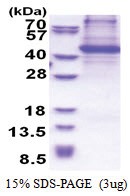BCAR1 / CRKAS (465-848, His-tag) Human Protein
Other products for "BCAR1"
Specifications
| Product Data | |
| Species | Human |
| Expression Host | E. coli |
| Expression cDNA Clone or AA Sequence |
MGSSHHHHHH SSGLVPRGSH MGSRLQQGVS ATVAHLLDLA GSAGATGSWR SPSEPQEPLV QDLQAAVAAV QSAVHELLEF ARSAVGNAAH TSDRALHAKL SRQLQKMEDV HQTLVAHGQA LDAGRGGSGA TLEDLDRLVA CSRAVPEDAK QLASFLHGNA SLLFRRTKAT APGPEGGGTL HPNPTDKTSS IQSRPLPSPP KFTSQDSPDG QYENSEGGWM EDYDYVHLQG KEEFEKTQKE LLEKGSITRQ GKSQLELQQL KQFERLEQEV SRPIDHDLAN WTPAQPLAPG RTGGLGPSDR QLLLFYLEQC EANLTTLTNA VDAFFTAVAT NQPPKIFVAH SKFVILSAHK LVFIGDTLSR QAKAADVRSQ VTHYSNLLCD LLRGIVATTK AAALQYPSPS AAQDMVE
|
| Tag | His-tag |
| Predicted MW | 43.9 kDa |
| Concentration | lot specific |
| Purity | >85% by SDS - PAGE |
| Presentation | Purified |
| Buffer | Presentation State: Purified State: Liquid purified protein Buffer System: 20 mM Tris-HCl buffer (pH 8.0) containing 0.4M UREA, 10% glycerol |
| Preparation | Liquid purified protein |
| Protein Description | Recombinant human BCAR1 protein, fused to His-tag at N-terminus, was expressed in E.coli. |
| Storage | Store undiluted at 2-8°C for one week or (in aliquots) at -20°C to -80°C for longer. Avoid repeated freezing and thawing. |
| Stability | Shelf life: one year from despatch. |
| Reference Data | |
| RefSeq | NP_001164185 |
| Locus ID | 9564 |
| UniProt ID | P56945 |
| Cytogenetics | 16q23.1 |
| Synonyms | CAS; CAS1; CASS1; CRKAS; P130Cas |
| Summary | The protein encoded by this gene is a member of the Crk-associated substrate (CAS) family of scaffold proteins, characterized by the presence of multiple protein-protein interaction domains and many serine and tyrosine phosphorylation sites. The encoded protein contains a Src-homology 3 (SH3) domain, a proline-rich domain, a substrate domain which contains 15 repeat of the YxxP consensus phosphorylation motif for Src family kinases, a serine-rich domain, and a bipartite Src-binding domain, which can bind both SH2 and SH3 domains. This adaptor protein functions in multiple cellular pathways, including in cell motility, apoptosis and cell cycle control. Dysregulation of this gene can have a wide range of effects, affecting different pathways, including cardiac development, vascular smooth muscle cells, liver and kidney function, endothelial migration, and cancer. [provided by RefSeq, Sep 2017] |
| Protein Families | Druggable Genome |
| Protein Pathways | Chemokine signaling pathway, Focal adhesion, Leukocyte transendothelial migration, Regulation of actin cytoskeleton |
Documents
| FAQs |
| SDS |
Resources
Recombinant Protein Resources |
{0} Product Review(s)
0 Product Review(s)
Submit review
Be the first one to submit a review
Product Citations
*Delivery time may vary from web posted schedule. Occasional delays may occur due to unforeseen
complexities in the preparation of your product. International customers may expect an additional 1-2 weeks
in shipping.






























































































































































































































































 Germany
Germany
 Japan
Japan
 United Kingdom
United Kingdom
 China
China
